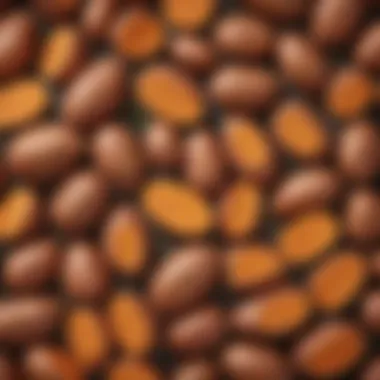Carbohydrate Analysis of Medium-Sized Sweet Potatoes


Intro
Understanding the carbohydrate content of foods is essential for many individuals, especially those who are monitoring their dietary intake. Sweet potatoes are often regarded as a nutritious option, yet their carbohydrate levels can vary based on several factors, including size and cooking technique. This article offers a thorough examination of the carbohydrate content found in medium-sized sweet potatoes, breaking down their nutritional profile, the impact of different cooking methods, and considerations for incorporating them into a balanced diet.
Sweet potatoes are not just a source of carbohydrates; they also provide fiber, vitamins, and minerals. This deep dive into their nutritional aspects serves readers who aim to make informed choices about their diets, particularly concerning carbohydrate management. By evaluating both raw and cooked sweet potatoes, we provide crucial insights to enhance your understanding of this versatile tuber.
Nutritional Profile of Sweet Potatoes
Sweet potatoes are a rich source of nutrients, offering more than just carbohydrates. Understanding their nutritional profile is vital for anyone interested in health and wellness.
- Carbohydrates: A medium-sized sweet potato typically contains approximately 24 grams of carbohydrates.
- Fiber: They are high in dietary fiber, which can aid digestion and promote a feeling of fullness.
- Vitamins and Minerals: Sweet potatoes are particularly high in Vitamin A, Vitamin C, and potassium.
The carbohydrate content varies notably between raw and cooked forms, influenced by cooking methods.
Influences on Carbohydrate Content
Several factors merit consideration when evaluating the carbohydrate content in sweet potatoes. These include:
- Size: Medium-sized sweet potatoes present a different nutritional profile than smaller or larger variants. Larger potatoes tend to have more carbohydrates overall.
- Cooking Methods: Methods such as boiling, baking, or frying can alter carbohydrate levels. For instance, boiled sweet potatoes generally have a different nutrient retention compared to baked ones.
End
This analysis serves as a valuable resource for food lovers and those intent on monitoring their carbohydrate intake. By understanding the carbohydrate content in medium-sized sweet potatoes, individuals can make smarter dietary decisions. As we delve deeper into the cooking aspects and practical tips in the coming sections, this foundational knowledge will guide your culinary journey with sweet potatoes.
Preamble to Sweet Potatoes
Sweet potatoes are more than just a staple in many diets; they hold significant nutritional value. Understanding their characteristics is vital. This section serves as an entry point into the properties and benefits of sweet potatoes, setting the stage for deeper exploration. By learning about these tubers, readers can appreciate their role not just as a food item but as an integral part of a balanced diet.
Overview of Sweet Potatoes
Sweet potatoes belong to the Convolvulaceae family and are often mistaken for yams. They come in various varieties, including orange, purple, and white. Each variety has unique flavors and textures. The orange-fleshed sweet potato is popular for its sweetness and high beta-carotene content, while the purple variant is praised for its anthocyanin antioxidant content. This diversity widens the scope of culinary uses, from soups to roasted dishes.
Nutritional Importance
Nutritionally, sweet potatoes are a power house. They are rich in vitamins such as vitamin A, C, and B6. Minerals like potassium and manganese contribute to the overall health benefits. The carbohydrate composition is noteworthy, consisting primarily of complex carbs, which provide sustained energy rather than quick spikes in blood sugar. With dietary fiber content, sweet potatoes also assist in digestive health, helping to regulate bowel movements and promote overall gut health.
"Sweet potatoes are nutrient-dense, which makes them a valuable addition to varying diets across all ages."
The importance of sweet potatoes extends to those monitoring their carbohydrate intake. Understanding their carbohydrate content helps in managing dietary choices, especially for those on low-carb diets or monitoring their glycemic load. Sweet potatoes can satisfy cravings for sweetness while providing essential nutrients.
Understanding Carbohydrates
Understanding carbohydrates is crucial for getting a clear picture of sweet potatoes' nutritional profile. Carbohydrates are a primary source of energy in our diet. They come in many forms, with two main categories: simple and complex. The way carbohydrates affect the body varies significantly, which is why it is essential to comprehend their structure and function. A detailed analysis can provide insights into how medium-sized sweet potatoes fit into various dietary approaches, particularly for those focused on carbohydrate intake management.
Types of Carbohydrates
Simple Carbohydrates


Simple carbohydrates are sugars that the body can quickly absorb and use for immediate energy. These include glucose, fructose, and sucrose. In sweet potatoes, simple sugars are present in smaller amounts compared to other carbohydrate types, but they still play an important role in their overall flavor.
The key characteristic of simple carbohydrates is their rapid digestibility. Because they break down quickly, they can provide instant energy, making them useful for individuals needing a fast energy boost. However, relying heavily on simple carbohydrates can lead to energy spikes, followed by significant drops, which may not be ideal for sustained energy levels.
A unique feature of simple carbohydrates in sweet potatoes is that they can enhance the sweetness without significantly increasing the overall carbohydrate content. This characteristic makes them popular among those who look for naturally sweet flavors in their meals while keeping an eye on their carbohydrate consumption.
"Simple carbohydrates can be beneficial for quick energy but should be balanced with other nutrient types."
Complex Carbohydrates
Complex carbohydrates consist of longer chains of sugar molecules. They are found in foods such as whole grains, legumes, and, of course, sweet potatoes. These carbohydrates break down more slowly in the body, providing a steadier flow of energy and prolonging satiety.
The significant advantage of complex carbohydrates is their ability to offer prolonged energy. This means that they can keep an individual feeling full and energized for longer periods. In terms of health benefits, complex carbohydrates are often accompanied by dietary fiber, aiding in digestion and promoting gut health, something found abundantly in sweet potatoes.
Sweet potatoes’ high fiber content influences their classification as a complex carbohydrate source. While there are some simple sugars present, the thoughtful combination of fiber and complex carbohydrates in sweet potatoes makes them an excellent choice for those looking to balance their diet without sacrificing flavor.
Role of Carbohydrates in Diet
The role of carbohydrates in a balanced diet cannot be overstated. Carbohydrates serve as the body’s main energy source. They play a critical role in brain function, physical activity, and overall metabolic processes. For individuals who lead an active lifestyle, carbohydrates help sustain energy levels during both exercise and daily activities.
In addition to providing energy, carbohydrates can also contribute to the intake of essential nutrients. Foods rich in carbohydrates, including sweet potatoes, often contain vitamins, minerals, and fiber that are necessary for a well-rounded diet. Careful consideration of the types of carbohydrates included in meals can lead to significant improvements in health outcomes, especially when it comes to managing weight and preventing chronic diseases.
By understanding the various facets of carbohydrates, especially in relation to medium-sized sweet potatoes, individuals can make informed dietary decisions that suit their personal health goals. This understanding may also facilitate better management of carbohydrate intake during meal planning.
Carbohydrate Content in Sweet Potatoes
Understanding the carbohydrate content in sweet potatoes is essential for those who monitor their dietary intake. Sweet potatoes are often favored for their nutritional benefits. Gaining insight into their carbohydrate makeup helps consumers make informed decisions regarding their food choices.
Carbohydrates provide energy and contribute to overall health, but not all carb sources are equal. Sweet potatoes stand out for their balance of sugars and fiber, making them a unique option in the carbohydrate spectrum. In this section, we will explore different aspects of carbohydrate content, including how it varies based on size and cooking methods.
Carbohydrate Breakdown
Total Carbohydrates
Total carbohydrates are the sum of all carbs present in the sweet potato, encompassing both sugars and fiber. A medium-sized sweet potato typically contains around 26 grams of total carbohydrates. This quantity contributes significantly toward daily energy needs.
The key characteristic of total carbohydrates is their ability to provide essential energy without causing drastic spikes in blood sugar, especially when consumed with the skin. This makes total carbohydrates in sweet potatoes a beneficial choice for individuals aiming for steady energy supplies throughout the day. However, excessive intake without balancing other nutrients can lead to unwanted weight gain.
Fiber Content
Fiber plays a crucial role in digestive health and aids in regulating blood sugar levels. Sweet potatoes are a good source of dietary fiber, with a medium-sized sweet potato containing about 4 grams. The fiber binds to sugars, slowing digestion and absorption.
This unique feature of fiber content in sweet potatoes makes it an attractive component for diets aimed at enhancing gut health and controlling hunger. Nonetheless, it’s important to note that people with certain digestive issues may need to monitor their fiber intake more closely.
Sugar Levels
Sugar levels refer specifically to the natural sugars found in sweet potatoes, primarily fructose and glucose. On average, a medium-sized sweet potato has around 5 grams of sugars. These sugar levels contribute to the appealing taste of sweet potatoes while also being relatively low compared to other carb sources.
The natural sweetness from sugar levels is a key characteristic that makes sweet potatoes versatile in both savory and sweet dishes. They can easily replace more processed sweeteners. Yet, it’s essential to consider portion sizes, especially for those managing blood sugar levels.


Variation by Size
Small-Sized Sweet Potatoes
Small-sized sweet potatoes typically contain fewer carbohydrates than their larger counterparts, estimating around 20 grams of total carbohydrates. This can be beneficial for individuals seeking to control their carb intake while still enjoying the nutrition of sweet potatoes. The relatively lower carb content in smaller varieties can make them more suitable for smaller meals or as side dishes.
However, their reduced size may offer less fiber and fewer vitamins per serving, which may not provide the full nutritional advantages seen in medium or larger sizes.
Medium-Sized Sweet Potatoes
Medium-sized sweet potatoes strike a balance between carbohydrate content and nutrition. The carbohydrate content of around 26 grams provides a more substantial energy source without being excessive, making it a valuable option for a variety of diets. These sweet potatoes often provide a more extensive range of vitamins and minerals than smaller ones, ensuring that consumers benefit nutritionally.
Additionally, their size allows for greater versatility in preparing meals, from main dishes to snacks.
Larger Sweet Potatoes
Larger sweet potatoes can contain up to 40 grams of carbohydrates. Although they are rich in nutrients, the higher carbohydrate content may not be ideal for everyone, especially those on low-carb diets. Their size lends them to be a filling option, which could help in meal planning.
However, caution is needed as larger portions could lead to overconsumption of carbohydrates and sugars, potentially affecting blood sugar levels. When consuming larger sweet potatoes, pairing them with protein or healthy fats may help in managing blood sugar response.
Cooking Methods and Their Impact
Understanding how different cooking methods affect the carbohydrate content in medium-sized sweet potatoes is essential for individuals who monitor their dietary intake. The way sweet potatoes are prepared can significantly alter their nutritional profile, particularly their carbohydrate levels. Cooking methods can change the digestibility of starches, affect the sugar concentration, and influence the amounts of dietary fiber retained. By delving deeper into these cooking methods, we can provide readers with insights that guide healthier eating habits.
Raw vs. Cooked Sweet Potatoes
Raw sweet potatoes contain a range of nutrients, but their carbohydrate content can be complex and less digestible. When cooked, the starches in sweet potatoes gelatinize, making them easier to break down and digest. This is a crucial aspect for anyone looking to maintain their energy levels effectively. Cooking also enhances the flavor and texture, making sweet potatoes more palatable. However, some water-soluble vitamins may decrease with extended cooking, an important consideration for a balanced diet. Both raw and cooked forms have their place, but understanding the differences allows for more informed dietary choices.
Different Cooking Techniques
Boiling
Boiling sweet potatoes is a popular technique due to its simplicity and accessibility. This method can effectively soften the tuber and make it easier to digest. One of the main benefits of boiling is that it preserves most of the carbohydrate content while reducing the calorie density, as some natural sugars may leach into the water. However, boiling can also lead to the loss of certain vitamins, as heat and water can break down sensitive micronutrients. It's essential to consider the cooking time to minimize nutrient loss. Boiling therefore offers a practical, if slightly nutrient-reducing choice for cooking sweet potatoes.
Baking
Baking sweet potatoes is favored for its potential to enhance the natural sweetness of this vegetable. This method caramelizes the sugars within the sweet potato, intensifying the flavor while maintaining a relatively higher fiber content compared to boiling, which can reduce fiber in the cooking process. Baking does take longer than boiling, which is a consideration for those in a time crunch. The texture of baked sweet potatoes is often more appealing, leading to a satisfying eating experience. However, it can result in slightly more energy-dense products due to moisture loss, making this method ideal for a hearty dish.
Microwaving
Microwaving is an efficient cooking method that significantly reduces cooking time. When sweet potatoes are microwaved, their nutrients remain largely intact, making this a healthy option. This technique avoids extended exposure to heat, minimizing the breakdown of vitamins and carbohydrates. Moreover, microwaving requires nearly no added water, which is advantageous as it prevents leaching out soluble nutrients. The primary downside may be the texture; while it cooks quickly, some may prefer the flavor and texture of baked or boiled sweet potatoes.
Frying
Frying sweet potatoes can add a distinct flavor and texture, making it a well-liked method for many. The sweetness and crispness achieved through frying can be appealing. However, it introduces additional fats, which can elevate the calorie count significantly. Additionally, frying might affect the overall health benefits due to the higher level of added oils. It is essential to consider the oil type and temperature used in frying, as decent oil can mitigate some health aspects, but it will always need to be balanced with moderation. This approach is thus more suitable for occasional indulgence rather than regular meals, particularly for those closely monitoring carbohydrate intake.
"Different cooking methods can greatly influence not only the carbohydrate content but also the overall health benefits associated with sweet potatoes."


Understanding these cooking methods and their impacts gives individuals the ability to make informed choices about sweet potatoes in their diet. Each method offers unique advantages and considerations, and thus, choosing the right technique depends on individual health goals and preferences.
Implications for Dietary Choices
Understanding the carbohydrate content in medium-sized sweet potatoes has considerable implications for dietary choices. Carbohydrates serve as one of the body's primary energy sources. Knowing how much carbohydrate is in sweet potatoes allows individuals to make informed decisions, especially when managing caloric intake or adhering to specific nutritional goals.
This section discusses several strategies for incorporating sweet potatoes effectively into various diets.
Low-Carb Diet Considerations
Low-carb diets have gained popularity for their potential to aid in weight loss and blood sugar management. These diets encourage the reduction of carbohydrate intake while emphasizing proteins and healthy fats. Despite their high carbohydrate content, sweet potatoes can still find a place in low-carb diets when consumed in moderate amounts.
The important consideration is portion control. Individuals often analyze not just the overall carbohydrate content but also how these carbohydrates affect blood sugar levels. Sweet potatoes have a lower glycemic index compared to other starchy foods, which makes them a potentially favorable option for some low-carb enthusiasts. By opting for smaller serving sizes and pairing them with protein or healthy fats, one can enjoy the nutritional benefits of sweet potatoes without exceeding carbohydrate limits.
Incorporating Sweet Potatoes into Various Diets
Vegan Diets
Vegan diets exclude all animal products, emphasizing plant-based foods. Sweet potatoes are a vital resource for vegans, offering essential nutrients such as fiber, vitamins, and minerals. Their carbohydrate content provides energy while their natural sweetness satisfies cravings, which is helpful for those transitioning to a vegan lifestyle.
A unique feature of vegan diets is the emphasis on whole foods. Sweet potatoes align well with this aspect. However, it is crucial for vegans to balance their meals, incorporating other fruits, vegetables, grains, and legumes to ensure adequate nutrient intake.
Gluten-Free Diets
For individuals with celiac disease or gluten intolerance, gluten-free diets are necessary. Sweet potatoes are naturally gluten-free and can replace traditional gluten-containing starches in many dishes. This characteristic makes sweet potatoes a popular choice for gluten-free diets, enriching them with vitamins and fiber.
Nonetheless, individuals must remain cautious about cross-contamination in prepared foods. Many store-bought products may include gluten, so opting for unprocessed sweet potatoes ensures a safe and nutritious option.
Balanced Diets
Balanced diets focus on a mix of carbohydrates, proteins, and fats to promote overall health. Sweet potatoes contribute to a balanced diet by providing not only carbohydrates but also essential vitamins. Their dietary fiber promotes digestive health, which complements any balanced dietary approach.
The key advantage of balanced diets is their flexibility. With moderate inclusion of sweet potatoes alongside other food groups, individuals can enjoy various flavors and nutrients. However, it's vital to remain conscious of overall caloric intake, particularly when combining sweet potatoes with other high-calorie foods.
Sweet potatoes can be a valuable component in different dietary frameworks when consumed mindfully. They offer energy and essential nutrients without demanding excessive carbohydrate intake. They are versatile enough to support various dietary preferences.
Culminations and Recommendations
In concluding this exploration, it is vital to highlight the significance of understanding the carbohydrate content in medium-sized sweet potatoes. This knowledge is particularly relevant for individuals who are closely monitoring their carbohydrate intake, whether for dietary preferences or health conditions such as diabetes. An appreciation of the specific carbohydrate makeup offers practical insights that can guide food choices effectively.
Summary of Carbohydrate Content
Medium-sized sweet potatoes typically contain around 20 grams of carbohydrates per 100 grams. These carbohydrates largely consist of complex carbohydrates, notably starches, along with dietary fiber and simpler sugars. The fibrous content plays a crucial role in promoting digestive health, while the sugars provide a source of energy. Here’s a closer look at the breakdown:
- Total Carbohydrates: Approximately 20 grams
- Dietary Fiber: About 3 grams
- Sugars: Roughly 7 grams
This nutritional profile highlights the balance between energy provision and fiber content, making sweet potatoes a worthwhile addition to various diets.
Sweet potatoes deliver complex carbohydrates, fiber, and essential nutrients, contributing positively to a balanced diet.
Final Thoughts on Sweet Potatoes
Sweet potatoes are more than just a side dish; they are a versatile ingredient that can fit into numerous dietary structures. The nutritional benefits they offer extend beyond carbohydrates. They are rich in vitamins such as vitamin A, which supports eye health, and offer antioxidants that can combat oxidative stress. Moreover, the culinary flexibility of sweet potatoes—be it baked, mashed, or turned into fries—allows individuals to enjoy them without getting bored.
In terms of dietary incorporation, it is essential to assess personal needs and preferences. Incorporating sweet potatoes can enhance meals, contribute to overall health, and provide satisfaction for food lovers. One cannot overlook their comforting nature and the diverse ways they can be prepared.







